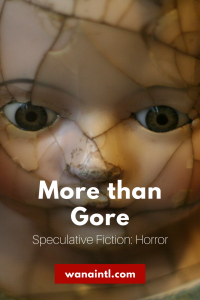
Fear is, in all likelihood, the single most complex human emotion. Our fears can keep us up at night, but they can also be the only thing that keeps us alive. They can save us, strangle us, liberate us or even destroy us. Like fire, fear can be mesmerizing and for sound reasons.
We understand on some primal level we NEED fear—that fear DOES keep us alive and often safe. Fear keeps us within society’s guidelines, since most of us (wisely) are afraid of prison. We check food expiration dates, pay our taxes, and avoid accepting loans from anyone with ‘THE’ as a middle name, (Vinnie the Fish, Marty the Clown, Jimmy The Snake etc.).
Fear is to thank for many of these sound decisions.
Alas, fear can also be the ‘tame’ tiger who’s our best cuddle buddy for ten years…until it tries to eat our face off. Ask Siegfried and Roy. Thus, fear’s dichotomous and volatile nature can’t help but draw us in like those proverbial (and suicidal) moths to the flame.
Last summer, I wrote a post about how shame is the beating heart of great fiction. But if shame is the heart, what is the BLOOD? The life force of truly magnificent stories?
My POV? Fear.
Fear IS Fiction
Some folks reading this might have a knee-jerk response of, ‘Oh, I don’t like horror.’ Yet, I want to point out ALL genres hinge on fear. What is a good romance without the fear of never being loved, never finding love, or finding then losing love?
Fear is what adds the breathless expectation, the race to the end turning pages as quickly as we can because we are AFRAID the couple we’re rooting for won’t get their act together before it’s too late.
Whether an MC is overthrowing an evil wizard, stopping a drug cartel, or opening that cupcake shop despite all her family’s nasty barbs and undermining, FEAR is the lifeblood that gives the story LIFE. The larger the fear (and more universal) the more resonant the story.
Fear AS Genre
All fiction has its place. Some fiction is purely fun and escape, and the world needs more fun and feel-good. Certain books are simply a holodeck. These stories allow us a safe space to get away.
Many books offer mental respite from the mundanities of life, a haven where we can regroup after dealing with the overwhelming pressures of being an adult (kids, laundry, bills, car repairs).
These stories serve as a place of rest and we all could use more of that!
But that isn’t all fiction.

Many writers (myself included) desire to go far deeper with our fiction, explore wounds and human issues. We’re compelled to poke and prod at larger social dilemmas. Stories offer a mechanism where we can ‘safely’ expose that which is diseased and ALSO show these cultural cancers can be irracidated.
Speculative fiction is an excellent outlet for easing our anxiety and that of the reader’s. It’s a genre that is HOT, HOT, HOT due to a plethora of factors including but not limited to: global media, living in a surveillance society, loss of privacy, government intrusion, and Facebook.
Then, there’s the constant exposure to every variety of threat (terrorism, politics, pestilence, artificial intelligence, robot girlfriends, Alexa, Siri, Amazon Prime, global warming, and…the Kardashians *shudders*).
I know writers are told not to write for the market, which is partial advice. We don’t ONLY write speculative stories because this genre is exploding in popularity.
If you hate these kinds of stories, by all means, avoid them PLEASE. But, writing is also a BUSINESS and to ignore a genre that is expanding faster than elastic waistbands at an All-You-Can-Eat Chinese buffet is plain dumb.
This genre is blowing up for sound reasons. Speculative fiction (horror is included in this) offers a myriad of ways to help us mere humans face all the stuff we fear the most. It helps us COPE.
Since fear practically saturates every area of our lives, readers are gravitating more and more to books that allow them to put a face to the fear and then kick its metaphorical @$$. We DO NOT LIKE feeling powerless and these stories hand us back some form of agency.
What is Speculative Fiction?
Speculative fiction is an umbrella term publishing uses to describe narrative fiction with supernatural or futuristic elements. This includes but it not necessarily limited to fantasy, science fiction, horror, utopian, dystopian, alternate history, apocalyptic fiction, post-apocalyptic fiction.
Basically, all the weird stuff.
(And forgive me because today we are using seriously broad strokes.)
But what makes the difference between the laughable 1950s science fiction matinees and the long-forgotten pulp fiction versus the works of Philip K.Dick? What makes The Road literature even though it’s a post-apocalyptic novella? Why is Heart-Shaped Box or Wool so deeply disturbing and simultaneously resonant?
Why do star-packed big-budget films like Jupiter Ascending fizzle? Yet Blade Runner is a science fiction staple worthy of being remade for the newest generations to enjoy?
Plot & FEAR
It’s easy to dismiss speculative fiction as escapist fluff and some of it is. But, when we look to the great speculative fiction, we see the authors are disguising explosive social commentary within narrative so it can be viewed and experienced behind the safety-glass/containment field of story.
By using story, we writers place the reader into this world then (hopefully) generate empathy that is impossible to create any other way. I’ve seen the movie I, Robot countless times and I bawl EVERY time during this scene.
Yeah this is me…
Stepford Wives was a commentary on the women’s liberation movement. Animal Farm was a treatise on socialism and the dangers of groupthink. The peril that comes with handing over too much power to those who claim to have noble and benevolent intentions without asking the hard questions.
Brave New World was Huxley’s stab at a culture propelled by temporary highs, unlimited choices and instant gratification while rejecting that which endured (love, family, marriage), because that which lasted required time, sacrifice and work. He showed us an eerily accurate picture of what society could become if we were not vigilant…and is now probably rolling in his grave.
*Makes note to write story about Huxley haunting Instagram*
Do Androids Dream of Electric Sheep? was Philip K. Dick’s commentary on artificial intelligence and just because we can play God, should we? What sort of moral implications are involved? These are issues we are now facing for real, that are no longer fiction and we are being tasked with the tough questions.
Is it wise to create and sell sex robots that come with a ‘frigid’ setting? What happens when we extend the logic of this? Blade Runner. We get Blade Runner. Also a bizarre escalation/reinvention of the previously mentioned Stepford Wives.
All these great science breakthroughs that float across our newsfeed are now fertile ground for new and possibly even better stories that prod the science with ethical dilemmas.
We show the world it’s upside down and maybe even ways to right it.
I believe that the great speculative fiction writers have always been the conscience of culture, the voice that whispers things like, ‘Just because we can, doesn’t mean we should.’ Or, ‘This really is a big deal and can go ugly really easily.’
Horror does a lot of that as well. Good horror writers tap into the subconscious angst and give it a face. What happens when society is allowed to continue to devalue human life? When mobs are handed permission to call the shots? Let’s chat about this after watching The Purge…which has ignited enough public frenzy to warrant being made into a USA Network television series (to be released Fall of 2018, btw).
To Make it BIGGER, Make it Smaller
When we care about everything, we care about nothing. Additionally, the human mind can’t truly grasp the loss of a billion lives. It doesn’t resonate because it can’t compute.
Thus the great spec-fic plots make the big small. We tell a small story of one person or a group of people as it plays out on the far larger stage. World War Z anyone?
This is why so many Hollywood movies about asteroids hitting the planet fizzle while The Road simply guts us.
Not All Big Stories are Big
Sometimes speculative fiction isn’t addressing something big, rather it dives into the intimate and deeply personal. Heart-Shaped Box is about a vengeful ghost out to destroy an aging rock star and anyone he loves.
While the supernatural elements are terrifying, what is so beautiful and moving about this story is how the malevolent ghost forces the MCs to face and conquer inner demons they would have been happy to bury…if not running for their lives.
The human story is what elevates this from a forgettable scary book into a work that prods at the deep dark places of the characters (and by extension the reader).
Character & FEAR
Writing speculative fiction is really tough. It has a lot in common with literary fiction. In FACT, spec-fic in general (INCLUDING HORROR) makes up a very large percentage of what’s viewed as ‘great literature.’ Fahrenheit 451, Brave New World, 1984, Frankenstein, Dracula, The Haunting of Hill House, everything written by Edgar Alan Poe EVER and I could go on.
But won’t 🙂 .
Alas, because speculative fiction shares so much familial DNA with literary fiction, it can suffer from similar degenerative diseases. Speculative fiction can easily turn preachy or rely too much on low-hanging fruit that wrecks great stories.
Horror might swing the literal ax too much, the ‘fear factor’ relying too much on shocking an audience that hasn’t been shocked since middle school. Dystopian, utopian, science fiction, can become an assembly line of derivative drones. In a similar vein, literary fiction can pummel us with pontification, and sedate us with sophistry. Ah, but so can speculative fiction.
*channels Edie Brickell*
Shove me in the shallow water before I get too deep…
World-building is backdrop and can never substitute for story. Yet, too many writers fixate on the element of storytelling at expense of the story. Spec-fic is tough. I swear it is the souffle of fiction. If we aren’t careful and look away one second? Yeah.
Plot of course matters. We need a core story problem to drive the story. Ah, but characters are vastly important and I’d even posit they’re even more important…kind of like literary fiction 😀 #Hmmmm.
We must develop multi-dimensional characters with flaws and problems to set on this adventure because gizmos, gadgets, spaceships, magic, chainsaws, gore and ghosts, big words and deep thoughts alone are not enough.
We don’t need a bigger asteroid…we need a better story.
Story is what is going to rattle the reader’s cage, not the two-ton spider or a warrior alien race like the Klingons but NOT because they’re Cling-Ons—a race of genetically engineered clones grown from needy exes imprisoned on a space colony after violating one too many intergalactic restraining orders…
I take that back.
I’d totally read that story.
Where was I? Yeah. So, more blood or teeth or guts won’t scare us, won’t rattle us, and sure as heck won’t change us.
In a world where we are overwhelmed with doom and gloom, where any debate on-line easily devolves into ranting, I think spec-fic is more important than ever in human history. Story is the place where the armor goes off and the heart is exposed and then able to be changed, fixed, remolded, and softened.
What Are Your Thoughts?
Do you love horror? Dystopian? Science fiction? What are your favorites? I LOVE HEARING FROM YOU! What makes spec-fic great? Or fall flat? What are your pet peeves?
If you really want to deep-dive how to write these incredible genres that are HOT, HOT, HOT!
Jump IN!
Sign up for my class More Than Gore: How to Write Horror. This class teaches techniques that are applicable to most genres, since this is class is a deep dive into what scares people and how to get under their skin. The better we are at rattling the readers’ safety, the faster they turn pages relishing in the thrill but desperate for it to be over…like a great rollercoaster ride.
Also, Cait and I are doing an ENTIRE Saturday on Speculative Fiction. You can purchase individually or SAVE BIG and get the BUNDLE. ALL THREE classes with the XXX Files Bundle.
***Remember we always include FREE recordings of classes in the purchase price.
I love hearing from you!
What do you WIN? For the month of AUGUST, for everyone who leaves a comment, I will put your name in a hat. If you comment and link back to my blog on your blog, you get your name in the hat twice. What do you win? The unvarnished truth from yours truly. I will pick a winner once a month and it will be a critique of the first 20 pages of your novel, or your query letter, or your synopsis (5 pages or less).
Upcoming Classes for August & September
 Brand Boss: When Your Name Alone Can Sell
Brand Boss: When Your Name Alone Can Sell
Instructor: Kristen Lamb
Price: General Admission $55.00 USD/ GOLD Level $175
Where: W.A.N.A. Digital Classroom
When: Thursday, Thursday September 13th, 2018. 7:00-9:00 p.m. EST
REGISTER HERE

Building Planet X: Out-of-This-World-Building for Speculative Fiction
Instructor: Cait Reynolds
Price: $55.00 USD
Where: W.A.N.A. Digital Classroom
When: Saturday, September 8th, 2018. 10:00 a.m.—12:00 p.m. EST
REGISTER HERE

Populating Planet X: Creating Realistic, Relatable Characters in Speculative Fiction
Instructors: Cait Reynolds & Kristen Lamb
Price: $55.00 USD
Where: W.A.N.A. Digital Classroom
When: Saturday, September 8th, 2018. 1:00—3:00 p.m. EST
REGISTER HERE
 Beyond Planet X: Mastering Speculative Fiction
Beyond Planet X: Mastering Speculative Fiction
Instructor: Kristen Lamb
Price: $55.00 USD
Where: W.A.N.A. Digital Classroom
When: Saturday, September 8th, 2018. 4:00—6:00 p.m. EST
REGISTER HERE

The XXX Files: The Planet X Speculative Fiction 3-Class Bundle
Instructors: Cait Reynolds & Kristen Lamb
Price: $110.00 USD (It’s LITERALLY one class FREE!)
Where: W.A.N.A. Digital Classroom
When: Saturday, September 8th, 2018. 10:00 a.m.—6:00 p.m. EST.
REGISTER HERE
Purchase includes FREE recording of all three classes.
More Than Gore: How to Write Horror
 Instructor: Kristen Lamb
Instructor: Kristen Lamb
Price: $40.00 USD
Where: W.A.N.A. Digital Classroom
When: THURSDAY, August 30th, 2018. 7:00-9:00 p.m. EST
REGISTER HERE

Keywordpalooza: Tune in, mellow out, and learn to love keywords for Amazon
Instructor: Cait Reynolds
Price: $55.00 USD
Where: W.A.N.A. Digital Classroom
When: Friday, September 7, 2018. 7:00—9:00 p.m. EST






 Brand Boss: When Your Name Alone Can Sell
Brand Boss: When Your Name Alone Can Sell Beyond Planet X: Mastering Speculative Fiction
Beyond Planet X: Mastering Speculative Fiction






5 comments
1 ping
Skip to comment form
What a highly intelligent,excellent writer you are Kristen; no bull. A fascinating piece. Although now ancient, I feel infant-like in my knowledge of all the new, fast-paced genres, fads and fancies in literary subject matter. But of course, fear itself has always up there on that dizzying pedestal threatening to crush us. I must admit I’m of an age where I yearn for humour and more of it, but would be a liar if I didn’t claim to enjoy being frightened out of my undies now and then. I’ve written a few short murder stories and thoroughly enjoyed the experience – to wrestle with those 26 letters is always a challenge – and maybe I’ll try horror before I fall off my perch.
Have you got some kind of gizmo, Kristen? One which predicts what your readers are thinking?
I’ve been considering trying another genre, following a conversation with my publisher. I was thinking of attempting a speculative novel, and along comes your latest piece.
My biggest worry is the kind of stuff that’s been done already… both the brilliant, and the dross (and the stuff that’s so bad it becomes good and earns itself a cult following).
The very best speculative fiction is that which, many years on, becomes completely different in character… but still valid. Books like EM Forster’s short, ‘The Machine Stops’.
When I first read it as a schoolboy in the early sixties, it was sci-fi pure and simple. Most of it was about unheard of technology way into the future… even then… though it was already over fifty years after the book was written.
But today, that same book feels very different, particularly to a modern younger reader. Forster’s prescience is staggering, in just how much of what he describes has become commonplace in our modern connected world.
Nowadays, the book can very easily be mistaken for a recently written steampunk tale, with today’s technology, but with a quaint old fashioned twist – The book pre-dates TV. Even simple telephony was in its infancy. The telegraph was more commonly used for long distance communications, yet Forster accurately predicts the internet, or something very similar.
The book’s story and its message still work, but the things which seemed so futuristic and incredible back in ’63 are now used every day by all of us… How must they have seemed to a reader when the novella was first published in 1909?… Yes… That’s over a century ago.
Check it out for yourselves…
( http://manybooks.net/titles/forstereother07machine_stops.html )… It’s an easy read, it’s short, and it’s free… and it shows all of us how ‘speculative’ should be done, even after all these years.
Thanks for the link and heads up on this story I never heard of. You are so right about Lamb’s prediction gizmo:)
I really do like holodeck fiction. Sad, but true.
I avoid horror completely as well as works like Fahrenheit 451. In my youth things like the Scarlet Letter and Good Earth appealed, but no longer.
I accidentally bought a meaty spec fic book earlier this year, and while I devoured it, I avoided the author afterwards. Yes, it was a good, compelling, and gripping book, but that’s not what I’m after these days.
I am so drained day after day by what’s happening in the world around me, I want my pleasure reading to be like slipping into a warm cozy bath.
Sci fi, futuristic, maybe fantasy. The world-building is tricky. There are too many ways to go wrong when you throw characters into the mix. Keeping track of the world and keeping track of characters can drive you over the edge, and maybe that’s what makes it fun and absorbing :). Thoughtful reflection on speculative fiction that kicks my writing itch into overdrive.
[…] her craft, Debbie Burke gives us 8 lessons from digging in the dirt, Kristen Lamb explains that fear is why humans crave stories that disturb them, and Shannon Baker and Jess Lourey flip that idea and say writers should write what we […]